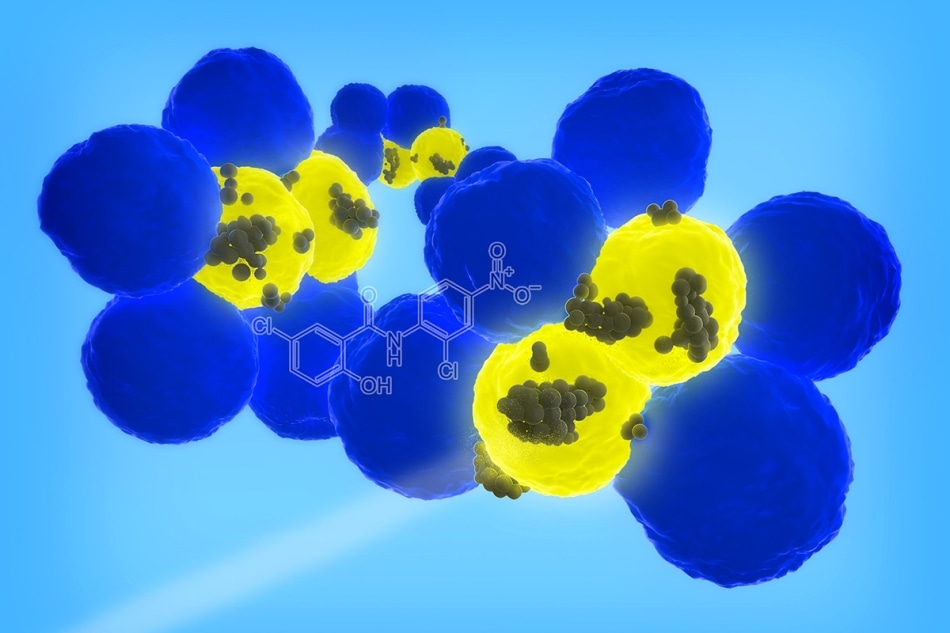Nov 28 2017
University of Illinois researchers are now sending small drug-laden nanoparticles on a mission that aims to seek and destroy cancer stem cells, the rare and elusive cells that can cause cancer to come back even after years have passed since the treatment of the initial tumor.
 Illinois researchers developed nanoparticles that can target cancer stem cells (yellow), the rare cells within a tumor (blue) that can cause cancer to recur or spread. Image courtesy of Dipanjan Pan
Illinois researchers developed nanoparticles that can target cancer stem cells (yellow), the rare cells within a tumor (blue) that can cause cancer to recur or spread. Image courtesy of Dipanjan Pan
In a study led by Dipanjan Pan, an Illinois professor of bioengineering, researchers have designed nanoparticles that explicitly bind to a protein responsible for marking the surface of breast cancer stem cells. Within the particles is the drug niclosamide – a drug usually prescribed all over the world for treating tapeworm infections, but in cancer stem cells this drug turns off main gene pathways that provides the cells with the stemlike properties that they need to grow and spread.
“It is critical to administer treatments for already-developed tumors; however, long-term survival and not allowing it to come back are equally important,” Pan said. “We want to destroy the cells that are hidden in the tissue and cause the cancer to come back or spread to other parts of the body.”
Cancer stem cells represent a small fraction of cells in a tumor, however, it only takes one or two to seed a new tumor, Pan stated. The challenge for researchers and physicians is not only finding these cells, but also treating them. Pan’s group developed nanoparticles that target a protein known as CD44, which appears only on the surface of cancer stem cells, and the group then tested them on breast cancer tumors in in live mice and in cell cultures.
I call them ‘GPS-enabled nanoparticles,’ because they seek out only the cells that have cancer stem cell properties. Then they latch onto the cells and deliver the drug,”To the best of our knowledge, this is the first demonstration of delivering cancer stem-cell-targeted therapy with a nanoparticle.
Dipanjan Pan, Professor of Bioengineering, Carle Illinois College of Medicine and the Beckman Institute for Advanced Science and Technology.
The researchers made use of the nanoparticles in order to deliver niclosamide, which is on the World Health Organization’s List of Essential Medicines, an index of the most effective and safest drugs in the world. Pan’s group earlier discovered that niclosamide functions on a specific gene-regulation pathway in cancer stem cells.
In the new study featured in the journal Molecular Cancer Therapeutics, the cancer stem cells lost their stemlike features after being treated with the niclosamide-bearing targeted nanoparticles, thus making them less able to cause recurrence or metastasize of the cancer. The researchers also saw a major decrease in complete cancer cell growth, both in the mice and in the cell cultures.
By making use of easy-to-manufacture nanoparticles and an already-approved drug, Pan hopes that this system can become a cost-efficient and accessible treatment for preventing cancer recurrence in patients
“We purposely used an extremely inexpensive drug. It’s generic and we can mass produce it on a very large scale,” Pan said. “The nanoparticles are a polymer that we can make on a large scale – it’s highly defined and consistent, so we know exactly what we are delivering. The rest of the process is just self-assembly.”
“This work also is important to future researchers working in the field of cancer stem cells,” said postdoctoral researcher Santosh Misra, the first author of the study. “We described and confirmed the proteins and genes responsible for vital processes in these cells, and that is opening up new avenues to make better therapies.”
The researchers are working to develop a combination therapy capable of delivering drugs for the primary cancer, such as standard chemotherapies, and also targeted agents capable of treating cancer stem cells. The researchers are also testing the nanoparticle drug-delivery system in huge animal models in order to bring it a step closer to the clinic.
This work was supported by the National Institutes of Health and the University of Illinois.